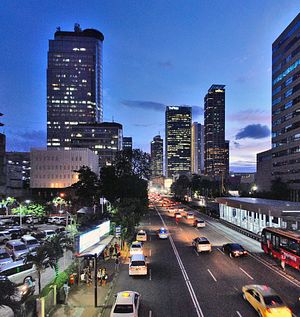Indonesia’s president announced Monday that the country’s capital will move from overcrowded, sinking, and polluted Jakarta to a site in sparsely populated East Kalimantan province on Borneo island, known for rainforests and orangutans.
President Joko “Jokowi” Widodo said intense studies over the past three years had resulted in the choice of the location on the eastern side of Borneo island.
The new capital city, which has not yet been named, will be in the middle of the vast archipelago nation and already has relatively complete infrastructure because it is near the cities of Balikpapan and Samarinda, Jokowi said.
He said the burden has been become too heavy on Jakarta on Java island as the center of government, finance, business, trade, and services as well as the location of the country’s largest airport and seaport.
Jokowi said the decision was made not to move the capital elsewhere on Java because the country’s wealth and people are highly concentrated there and should be spread out.
Currently 54 percent of the country’s nearly 270 million people live on Java, the country’s most densely populated area.
“We couldn’t continue to allow the burden on Jakarta and Java island to increase in terms of population density,” Jokowi said at a news conference in Jakarta’s presidential palace. “Economic disparities between Java and elsewhere would also increase.”
In an interview with The Associated Press last month, Jokowi said he wants to separate the center of government from the country’s business and economic center in Jakarta.
Jakarta is an archetypical Asian mega-city with 10 million people, or 30 million including those in its greater metropolitan area. It is prone to earthquakes and flooding and is rapidly sinking due to uncontrolled extraction of ground water. The ground water is highly contaminated as are its rivers. Congestion is estimated to cost the economy $6.5 billion a year.
Mineral-rich East Kalimantan was once almost completely covered by rainforests, but illegal logging has removed many of its original growth. It is home to only 3.5 million people and is surrounded by Kutai National Park, known for orangutans and other primates and mammals.
Jokowi said the relocation of the capital to a 180,000-hectare (444,780-acre) site will take up a decade and cost as much as 466 trillion rupiah ($32.5 billion), of which 19 percent will come from the state budget and the rest will be funded by cooperation between the government and business entities and by direct investment by state-run companies and the private sector.
He said the studies determined that the best site is between two districts, North Penajam Paser and Kutai Kertanegara, an area that has minimal risk of disasters such as floods, earthquakes, tsunamis, forest fires, volcanic eruptions, or landslides in the seismically active nation.
Indonesia’s founding father and first president, Sukarno, once planned to relocate the country’s capital to Palangkaraya in Central Kalimantan province.
Infrastructure improvement has been Jokowi’s signature policy and helped him win a second term in April elections.
Decades of discussions about building a new capital on Borneo island moved forward in April when Jokowi approved a general relocation plan. He appealed for support for the move in an annual national address on the eve of Indonesia’s independence day on August 16.
He said Monday that his government is still drafting a law on the new capital, which will need to be approved by Parliament.
By Niniek Karmini for The Associated Press.

































